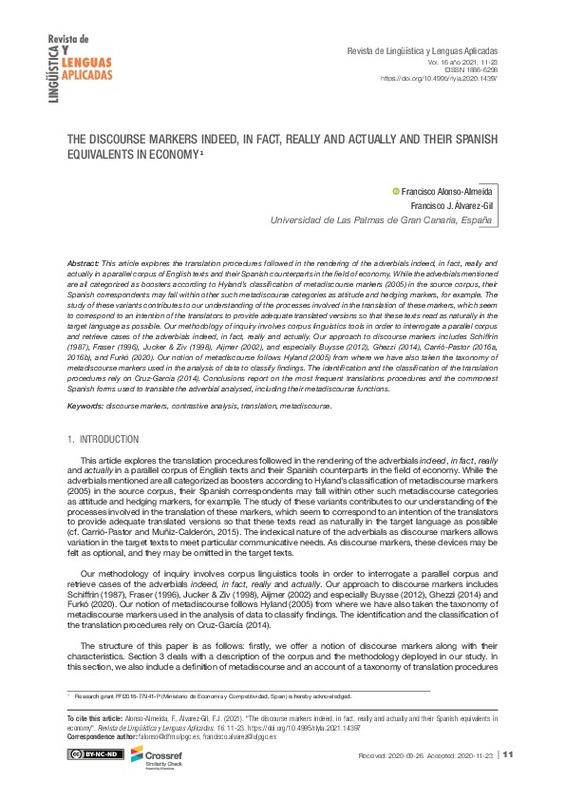Aijmer, K. (2002). English Discourse Particles (Studies in Corpus Linguistics). Vol. 10. Amsterdam: John Benjamins Publishing Company. https://doi.org/10.1075/scl.10
Alonso-Almeida, F. & Sánchez, A. (2016). "'If they have not the french': translation choices in The Happy Deliverie of Women (1612)", The Translator 22/1, 40-58. https://doi.org/10.1080/13556509.2015.1032535
Andersen, G & Fretheim, T. (2000). "Introduction", in G. Andersen & T. Fretheim (eds.), Pragmatic Markers and Propositional Attitude. Amsterdam: John Benjamins Publishing Company, 1-16. https://doi.org/10.1075/pbns.79.01and
[+]
Aijmer, K. (2002). English Discourse Particles (Studies in Corpus Linguistics). Vol. 10. Amsterdam: John Benjamins Publishing Company. https://doi.org/10.1075/scl.10
Alonso-Almeida, F. & Sánchez, A. (2016). "'If they have not the french': translation choices in The Happy Deliverie of Women (1612)", The Translator 22/1, 40-58. https://doi.org/10.1080/13556509.2015.1032535
Andersen, G & Fretheim, T. (2000). "Introduction", in G. Andersen & T. Fretheim (eds.), Pragmatic Markers and Propositional Attitude. Amsterdam: John Benjamins Publishing Company, 1-16. https://doi.org/10.1075/pbns.79.01and
Berk-Seligson, S. (2002). The Bilingual Courtroom: Court Interpreters in the Judicial Process (Language and Legal Discourse). Chicago: University of Chicago Press. https://doi.org/10.7208/chicago/9780226923277.001.0001
Blakemore, D. (2004). "Discourse markers", in L. R. Horn & G. Ward (eds.), The Handbook of Pragmatics. Oxford: Blackwell Publishing, 221-240. https://doi.org/10.1002/9780470756959.ch10
Blakemore, D. & Gallai, F. (2014). "Discourse markers in free indirect style and interpreting", Journal of Pragmatics 60, 106-120. https://doi.org/10.1016/j.pragma.2013.11.003
Bouveret, M. & Carter-Thomas, S. (2020). "More of the same or something different? An analysis of the French discourse marker par ailleurs in academic writing", Journal of Pragmatics 156, 136-148. https://doi.org/10.1016/j.pragma.2019.04.002
Brinton, L. J. (1996). Pragmatic Markers in English. Grammaticalization and Discourse Functions. Berlin: Mouton de Gruyter. https://doi.org/10.1515/9783110907582
Buysse, L. (2012). "So as a multifunctional discourse marker in native and learner speech", Journal of Pragmatics 44/13, 1764-1782. https://doi.org/10.1016/j.pragma.2012.08.012
Carrió-Pastor, M. L. (2016a). A contrastive study of interactive metadiscourse in academic papers written in English and in Spanish, en F. Alonso Almeida, L. Cruz García y V. González Ruiz (Eds.), Corpus-based studies on language varieties. Bern: Peter Lang, pp. 80-102.
Carrió-Pastor, M. L. (2016b). A contrastive study of the hedges used by English, Spanish and Chinese researchers in academic papers, en F. Alonso Almeida et al. (Eds.), Input a word, analyze the world: Selected approaches to Corpus Linguistics. Newcastle upon Tyne: Cambridge Scholars, pp. 477-492.
Carrió-Pastor, M. L. (2016c). Mitigation of claims in medical research papers: A comparative study of English and Spanish writers. Communication & Medicine, 13: 1-25. https://doi.org/10.1558/cam.28424
Carrió Pastor, M. L. (2019). Authorial engagement in business emails: a cross-cultural analysis of attitude and engagement markers, en C. Sancho Guinda (Ed.), Engagement in Professional Genres. Amsterdam: John Benjamins, pp. 47-65. https://doi.org/10.1075/pbns.301.03car
Carrió-Pastor, M. L. y Muñiz Calderón, R. (2015). A contrastive analysis of metadiscourse features in business e-mails written by non-native speakers of English. Procedia, Social and Behavioral Sciences, 173, 214-221. https://doi.org/10.1016/j.sbspro.2015.02.055
Crible, L. & Pascual, E. (2020). "Combinations of discourse markers with repairs and repetitions in English, French and Spanish", Journal of Pragmatics 156, 54-67. https://doi.org/10.1016/j.pragma.2019.05.002
Cruz García, L. (2014). "Copy Adaptation, or How to Translate a Source Product for a Target Market", Meta 58/2, 347-372. https://doi.org/10.7202/1024178ar
Fischer, K. (2006). "Towards an understanding of the spectrum of approaches to discourse particles: introduction to the volume", in K. Fischer (ed.), Approaches to Discourse Particles. Amsterdam: Elsevier, 1-20.
Fraser, B. (1990). "An approach to discourse markers", Journal of Pragmatics 14/3, 167-190. https://doi.org/10.1016/0378-2166(90)90096-V
Fraser, B. (1996). "Pragmatic markers", Pragmatics 6, 167-190. https://doi.org/10.1075/prag.6.2.03fra
Fraser, B. (1999). "What are discourse markers?", Journal of Pragmatics, 31/7, 931-952. https://doi.org/10.1016/S0378-2166(98)00101-5
Furkó, P. B. (2020). Discourse Markers and Beyond Descriptive and Critical Perspectives on Discourse-Pragmatic Devices across Genres and Languages. Cham, Switzerland: Palgrave Macmillan. https://doi.org/10.1007/978-3-030-37763-2
Ghezzi, C. & Molinelli, P. (2014). "Discourse and pragmatic markers from Latin to the Romance languages: New insights", in C. Ghezzi & P. Molinelli (eds.), Discourse and Pragmatic Markers from Latin to the Romance Languages. Oxford: Oxford University Press, 1-9. https://doi.org/10.1093/acprof:oso/9780199681600.003.0001
Ghezzi, C. (2014). "The development of discourse and pragmatic markers", in C. Ghezzi & P. Molinelli (eds.), Discourse and Pragmatic Markers from Latin to the Romance Languages. Oxford: Oxford University Press, 10-26. https://doi.org/10.1093/acprof:oso/9780199681600.003.0002
Halliday, M. A. K. & Hasan, R. (1976). Cohesion in English. London: Longman.
Hyland, K. (2005). Metadiscourse. Exploring Interaction in Writing. London, New York: Continuum.
Jucker, A. H. (1993). "The discourse marker well: A relevance theoretical account", Journal of Pragmatics 19/5, 435-452. https://doi.org/10.1016/0378-2166(93)90004-9
Jucker, A. H. & Ziv, Y. (1998). "Discourse markers: Introduction", in A. H. Jucker & Y. Ziv (eds.), Discourse Markers. Description and Theory. Amsterdam, Philadephia: John Benjamins, 1-12. https://doi.org/10.1075/pbns.57.03juc
Lutzky, U. (2012). Discourse Markers in Early Modern English (Pragmatics & Beyond New Series). Vol. 227. Amsterdam: John Benjamins Publishing Company. https://doi.org/10.1075/pbns.227
Nyan, T. (2016). Context Construction as Mediated by Discourse Markers. Leiden: BRILL. https://doi.org/10.1163/9789004273818
Schiffrin, D. (1987). Discourse Markers (Studies in Interactional Sociolinguistics). Cambridge: Cambridge University Press. https://doi.org/10.1017/CBO9780511611841
Schourup, L. (2011). "The discourse marker now: A relevance-theoretic approach", Journal of Pragmatics 43/8, 2110-2129. https://doi.org/10.1016/j.pragma.2011.01.005
Torabi Asr, F. & Demberg, V. (2020). "Interpretation of Discourse Connectives Is Probabilistic: Evidence From the Study of But and Although", Discourse Processes 57/4, 376-399. https://doi.org/10.1080/0163853X.2019.1700760
[-]









